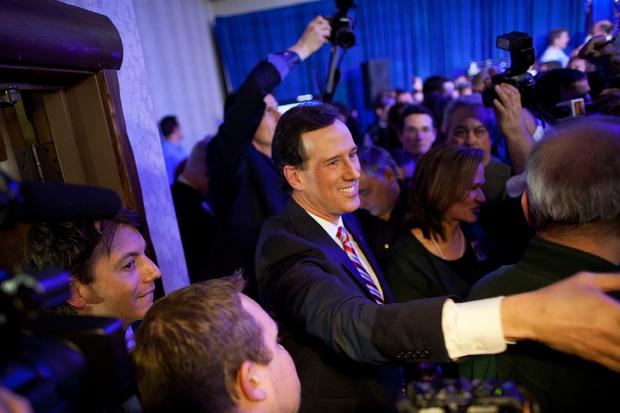The nail in the Iowa caucuses coffin
Commentary from senior political reporter Brian Montopoli.
Can we finally stop taking the Iowa caucuses seriously? Please?
The news this morning that the state Republican Party doesn't actually know who won the caucuses - since certifiable, written vote totals from eight of the state's 1,774 precincts cannot be found - is the latest piece of evidence that the massive media focus on the Hawkeye State every four years is unfounded.
The caucuses, as I wrote earlier this year, are overhyped and unrepresentative - not to mention meaningless, since the delegates awarded from the outcome are not binding at the party convention. Every four years, a tiny subset of people, who don't reflect the racial or ideological breakdown of the rest of the country, wield enormous power over the presidential race.
Iowans defend their claim to the first-in-the-nation status - which they've codified into law, so don't you get any ideas, Minnesota -- with the ridiculous, self-serving claim that they are somehow more qualified to see into the candidates' souls than the rest of the country. For evidence, they point to pandering by candidates desperate to win their votes, who crisscross the state every four years telling its residents just how gosh darn great they are.
The best argument for taking the caucuses seriously is the fact that the candidates spend so much time and money to win there. But their reason for doing so, in many cases, isn't delegates - it's the narrative-hungry media, which uses the caucus results to build up or tear down candidates as part of the campaign storyline.
And now this. After Mitt Romney was declared the narrow winner of the caucuses by eight votes over Rick Santorum in the early hours of January 4 - and then went on to win the New Hampshire primary a week later - it prompted pundits to deem Romney the breakaway frontrunner for the nomination. Now that we know he maybe didn't win Iowa (Santorum leads by 34 votes, but again, they can't find a bunch of them), one can't help wonder what might have been.
Would the Santorum bump out of the caucuses been a surge that would have propelled him to the front of the pack? Would Romney have done less well in New Hampshire had he not had the positive headlines out of the Hawkeye State? We'll never know.
Santorum's campaign tried to capture some of the buzz he may have been robbed of a few weeks ago in the wake of this morning's announcement, with Santorum National Communications Director Hogan Gidley claiming a win and saying "the narrative that Governor Romney and the media have been touting of 'inevitability' has been destroyed." Romney, meanwhile, stressed the results show a "virtual tie" and recognized Santorum "for his strong performance in the state."
In the end, however, should it really matter which of them won? I'm not saying the caucuses have no value: Santorum's rise did show his ability to connect while doing retail politics, though such a skill has limited usefulness in a national campaign. But considering that you can win Iowa with fewer folks than it takes to fill a decent-size baseball stadium, there's no question that the whole thing is overblown - especially when a swing of a dozen votes one way or another is treated like a game-changing event.
In truth, the problem here is bigger than the caucuses: It's an ever-shrinking news cycle that demands a twisting and turning narrative and gives journalists an interest in overlooking the flaws in the system. The outsize profile of the caucuses is just an outgrowth of that. But we've got to start somewhere. And when you're talking about the excesses of campaign coverage, there's no better place to look than the Hawkeye State.
